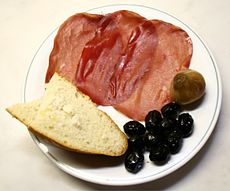Bresaola

Bresaola della Valtellina (PGI/IGP), olives, a pickled onion and bread
Bresaola (pronounced [breˈzaːola]) is air-dried, salted beef (but also horse, venison and pork) that has been aged two or three months until it becomes hard and turns a dark red, almost purple colour. It is made from top (inside) round, and is lean and tender, with a sweet, musty smell.[1] It originated in Valtellina, a valley in the Alps of northern Italy's Lombardy region.[2]
The word comes from the diminutive of Lombard bresada (braised).
Contents
1 Production
2 Serving
3 Similar products
4 See also
5 References
6 External links
Production
A strict trimming process is essential to give the unique flavour. Legs of beef are thoroughly defatted and seasoned with a dry rub of coarse salt and spices, such as juniper berries, cinnamon and nutmeg. They are then left to cure for a few days. A drying period of between one and three months follows, depending on the weight of the particular bresaola. The meat loses up to 40% of its original weight during aging.
In Valtellina, a similar process is applied to smaller pieces of meat. This produces a more strongly flavoured product, slinzega, which is similar to South African biltong. Traditionally, horse meat was used for slinzega, but now other meats, such as venison and pork, are used, as well.
Serving
As an antipasto, bresaola is usually sliced paper-thin and served at room temperature or slightly chilled.[3] It is most commonly eaten on its own, but may be drizzled with olive oil and lemon juice or balsamic vinegar, and served with rocket (rucola, arugula) salad, cracked black pepper, and freshly shaved Parmesan cheese. Bresaola is sometimes confused with carpaccio, which is made from thinly sliced raw beef (the other ingredients are the same). Sliced bresaola should be stored well wrapped in a refrigerator.
Similar products
The bresaola produced in Valtellina is now a protected geographical indication (PGI) under EU Regulation 2081/92. Since this designation, dried beef made outside Valtellina may carry a generic name such as viande séchée or "beef prosciutto". There are traditional products from several other areas that are similar:
Bündnerfleisch (Bindenfleisch): from across the border in Grisons, Switzerland
Brési: from the Doubs region of France
Carne de sol: from northeastern Brazil
Cecina: from León, now used elsewhere in Spain and Latin America (Cecina de León also has PGI status)
Charque: from southern Brazil
Chipped beef: from the United States
Dendeng: from Indonesia
Nagelhout: from the east of the Netherlands
Pastırma: from Turkey, the Middle East, Caucasus and the Balkans
Pemmican (Pemmikan): from North America
Suho meso: from the Slavic countries
Carpaccio de buey: from Italy is a fresh (non-preserved) variant popularized as an appetizer in 1950
See also
- List of dried foods
- List of smoked foods
- Salumi
References
^ "Bresaola"..mw-parser-output cite.citation{font-style:inherit}.mw-parser-output q{quotes:"""""""'""'"}.mw-parser-output code.cs1-code{color:inherit;background:inherit;border:inherit;padding:inherit}.mw-parser-output .cs1-lock-free a{background:url("//upload.wikimedia.org/wikipedia/commons/thumb/6/65/Lock-green.svg/9px-Lock-green.svg.png")no-repeat;background-position:right .1em center}.mw-parser-output .cs1-lock-limited a,.mw-parser-output .cs1-lock-registration a{background:url("//upload.wikimedia.org/wikipedia/commons/thumb/d/d6/Lock-gray-alt-2.svg/9px-Lock-gray-alt-2.svg.png")no-repeat;background-position:right .1em center}.mw-parser-output .cs1-lock-subscription a{background:url("//upload.wikimedia.org/wikipedia/commons/thumb/a/aa/Lock-red-alt-2.svg/9px-Lock-red-alt-2.svg.png")no-repeat;background-position:right .1em center}.mw-parser-output .cs1-subscription,.mw-parser-output .cs1-registration{color:#555}.mw-parser-output .cs1-subscription span,.mw-parser-output .cs1-registration span{border-bottom:1px dotted;cursor:help}.mw-parser-output .cs1-hidden-error{display:none;font-size:100%}.mw-parser-output .cs1-visible-error{font-size:100%}.mw-parser-output .cs1-subscription,.mw-parser-output .cs1-registration,.mw-parser-output .cs1-format{font-size:95%}.mw-parser-output .cs1-kern-left,.mw-parser-output .cs1-kern-wl-left{padding-left:0.2em}.mw-parser-output .cs1-kern-right,.mw-parser-output .cs1-kern-wl-right{padding-right:0.2em}
^ "About Bresaola: Italian Dry-Cured Beef".
^ Hayward, Tim (13 May 2011). "How to make bresaola" – via www.theguardian.com.
External links
Consorzio tutela Bresaola della Valtellina, Protected Geographical Status Consortium
